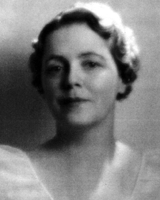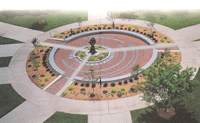
Ada Woodward Roberts
is honored with a Medium Paver from Peggy R. Browning.
 1888-1938
1888-1938
Ada Woodward was 12 in 1900 and already longing to leave the small towns of Kansas where her father was a Methodist Episcopal minister. Her way to the larger world was to be through her love of music and the piano. She began by arranging her own recital after which she started giving piano lessons to children.
At age eighteen she was elected head of the music department at Oklahoma State Normal, a teachers college. She maintained her position while taking music theory courses by mail from Denver University. Each summer she went to Denver or Chicago to take lessons from former pupils of Vienna's most respected master of the piano, Leschetizsky. She achieved a degree in music from the University of Denver and gave a debut recital in Chicago in 1909 at twenty-one.
In 1912, she went to Vienna to study under Leschetizsky. No prior arrangements had been made with him, but she did have letters of recommendation from her teachers. Still, she was told there was no way she could get lessons from the master unless she waited a year or more. She couldn't wait. So she just quietly presented herself at his home, told the maid she was a pupil and was admitted. He was amused, let her play for him and let her stay.
Some months later it was Christmas Day when she and other American students were invited to the American Embassy. Here she met another Kansan, my father, Sam E. Roberts who, like her, had been determined to get further training in Vienna. He was a young doctor who wanted to settle in Kansas City, Missouri. They fell very much in love and were married on Christmas Day, 1914, two years after they met. They waited until they had paid off their debts.
In Kansas City, my mother helped to start the symphony. In 1925 and '26 she played as guest artist on two occasions when the "Kansas City Little Symphony Orchestra" led by N. DeRubertis came to Wichita's High School auditorium (now East High). I quote from the Wichita Eagle: "She gave a remarkable performance, meeting the unlimited demands of the Liszt Busoni Spanish Rhapsody with a brilliance which matched the power of the orchestral accompaniment. She performed the lightly delicate passages with dexterity and ease and built up sonorous climaxes which were astonishing for their power. Her rare poise and gracious manner instantly won the approbation of the audience." At home she had practiced from one to three a.m.
By this time her eldest daughter was eight and we twin girls were five. Her husband was a very successful ear, nose and throat specialist. Their European experience led to their building a large Mediterranean home above a sunken garden in the Mission Hills section of Kansas City. The house was not completed until the summer of 1930, just in time for the worst of the Depression and the years of drought and dust bowl. Living through those years meant you didn't know how long the hard times would last or how deeply they would cut. As a Methodist minister's daughter, my mother knew how to economize and we did--even to the point of winding basting thread back on empty spools.
Besides entertaining Rosa Ponselle and several other opera stars in our home, Mother continued some playing and composing. Her "Toll of Mars," a war song, was sung in the Roosevelt White House by Lawrence Tibbetts. Other compositions were beginning to be published in New York. But, in 1938, after living in her elegant home less than eight years, my lovely, accomplished mother died of pneumonia. That next year the first of the "wonder drugs," Sulfanilimide, came along. She was only forty-nine.
I continue to remember her with loving appreciation.
A tribute by her daughter, Peggy Roberts Browning
June 2, 1998










